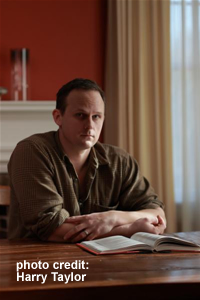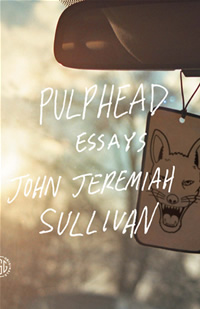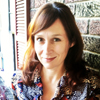John Jeremiah Sullivan is widely understood to be one our great contemporary nonfiction writers, possessed of a voice that’s uniquely equipped to snare readers with depth-charged examinations of topics they never considered worthy of much thought. Like David Foster Wallace, Bill Buford, George Plimpton, and Tom Wolfe before him, Sullivan is capable of inserting himself into his reportage with charming results, but he also knows when to duck out and let his subject command center stage. His collection of essays and feature articles, Pulphead, racked up a stunning array of praise upon publication. As Sarah Norris wrote in Chapter 16’s review, “He has a penchant for oddity, for characters and situations that stay with you long after you’ve finished reading. In this collection Sullivan demonstrates a superb ability to find the absurd in the mundane, and to tease out overlooked details that not only bring his subjects to life but also illuminate the human condition.”
 In his exploration of cultural norms and institutions Sullivan is often wryly funny—as in his under-the-influence romp through Disneyworld, (or that time he played guinea pig in the spa industry for The New York Times. On the other hand, he’s never far from a switchback into serious cultural analysis, helping us grasp, or see anew, the significance of a kaleidoscopic range of American figures and phenomena.
In his exploration of cultural norms and institutions Sullivan is often wryly funny—as in his under-the-influence romp through Disneyworld, (or that time he played guinea pig in the spa industry for The New York Times. On the other hand, he’s never far from a switchback into serious cultural analysis, helping us grasp, or see anew, the significance of a kaleidoscopic range of American figures and phenomena.
Now working on a new book-length project, Sullivan is also—in his own words—an “ersatz, offsite staff member” at the Paris Review, where he holds the title of Southern Editor. He answered questions from Chapter 16 via email prior to his forthcoming talk at the University of the South, his alma mater:
Chapter 16: I imagine that the wide-ranging subject matter of your work results in curious follow-ups over time, the real-life subject continuing to knock at the door, so to speak, long after you’ve published your take on it. Is there any particular story you’ve reported, or subject you’ve profiled, that has resurfaced in particularly interesting ways?
Sullivan: All subjects come back, both to haunt and to goad you. The best ones do it the most. That’s one of the ways you recognize them. By best, I mean the subjects that trouble you in a deep enough way to sustain you. This is happening now to me with the story of my brief time knowing Andrew Lytle. I wrote about him ten years ago, and now this experience of being invited to speak at Sewanee has brought up some of the same memories, and motivated me to write about him again. I want to be clearer about certain things I tried to say before. That is always the motivation, to be more clear. But the truth likes to resist that. “Nature hides.”
Chapter 16: You’ve written about situations, cultures, and sites where you felt at least partly, if not essentially, an outsider: Disneyworld, a huge Christian rock festival, and the spa industry, to name a few. What are some other such ‘exotic’ places or things you’d jump at the chance to investigate?
Sullivan: Yes, I was a traveling writer of periodical essays for fifteen years. It would be churlish to pretend like that wasn’t stupidly fun at times, even much of the time. But I managed to spend a decent percentage of it moaning about how I wanted to be at home working on my books, my “real work.” Now I’m doing that, and the magazine job seems like a wonderful golden adventure.
Well, at times it was that. At times it was just weird and disorienting. You found yourself doing two things in a twenty-four-hour span that were too different from each other. You couldn’t combine them into a coherent reality. For a while, after I started working on this new book (about the South in the early-eighteenth century), I was keeping a list of the assignments I’d said no to. See, I never used to say no to anything. Couldn’t afford to. Too much of my Grub Street father in me—if you say no once, they may never ask again. So it was sort of a novelty to be saying no. But the list got so depressing. I was turning down these crazy assignments. Cave art in Indonesia. There’s a second life I lived while staying here in the house for two years. It has been interesting for somebody in a parallel reality.
Chapter 16: One much vocalized argument has it that essays are a hot—or, well, hotter—commodity at present, with both publishers and readers warming to the charms of the form. What do you suppose is behind that trend—or do you question the hype?
 Sullivan: My suspicion is that if “we” are still here in 150 years and can look back on the writing done in English between, say, 1960 and now, we’d see more continuity than anything. I.e., that essays were being written and published pretty steadily in all their forms—literary essays in the classical mode (“On Solitude”), long-form magazine journalism, scholarly-scientific writing that pays attention to style and artistry, plus hybrids. Maybe more in that last category, recently. If there has been an increase of energy around the essay as a form, I don’t know.
Sullivan: My suspicion is that if “we” are still here in 150 years and can look back on the writing done in English between, say, 1960 and now, we’d see more continuity than anything. I.e., that essays were being written and published pretty steadily in all their forms—literary essays in the classical mode (“On Solitude”), long-form magazine journalism, scholarly-scientific writing that pays attention to style and artistry, plus hybrids. Maybe more in that last category, recently. If there has been an increase of energy around the essay as a form, I don’t know.
It may be a phenomenon of the publishing industry more than anything, of marketing, and the feedback loops between those and the M.F.A. programs, what the journals are willing to publish, etc. The essay lends itself to the Internet in a way that’s unique to all the genres. Of course I’ve talked my way into saying there is a phenomenon. Well, that’s the case, it both is and isn’t real, in the sense that we create it. If readers are paying more attention to essays, then the writers will start to respond. We’ll speak where the audience gathers. Some of us.
Chapter 16: To whose work would you direct readers who enjoy your voice and sensibility, or first-person reportage in general? What other writers should they seek out?
Sullivan: I don’t know if she has anything in common with me, or if an enjoyment of my work would lead to hers (seems doubtful), but I’d encourage anybody to read Svetlana Alexievich, the Belarusian journalist who recently won the Nobel Prize for Literature. I don’t know what it is about people from that part of the world. They just go deeper.
Chapter 16: About a year ago, you won the Windham Campbell Prize and said that the award would be quite helpful in allowing you to dig deep into research and “not look up.” Where has your research taken you in the past year?
Sullivan: It has traveled along two channels. One has been blues-related, and involves a reconstruction of the life story of Mamie Smith. The other has to do with the South in the eighteenth-century, and an obscure utopian figure from that period who has been tormenting me since I was a student at Sewanee. His name was Priber. My book about him will be published by Random House next year.
Chapter 16: Writing, particularly long-form reporting, allows the writer to get up close with the ways other people spend their days and make their livings. Imagine you couldn’t write anymore—that it was simply no longer an option. What might you do instead?
Sullivan: It’s as if you’d asked me, “You just lost your arms and legs, what might you do?” First I’d be really depressed for a long time. Then I might get into social work. I don’t know why; I’ve always felt that I would enjoy it. My father-in-law did it for decades, worked in a welfare office, and I was always slightly jealous. Partly it’s the good sleep that comes from doing a little good every day. And partly it’s as you say, the exposure to people, their life stories, in all their terrible beauty.

Susannah Felts is a writer, editor, and educator in Nashville, as well as co-founder of The Porch, a nonprofit literary center. She is the author of This Will Go Down On Your Permanent Record, a novel, and numerous journal and magazine articles.
Tagged: Nonfiction





